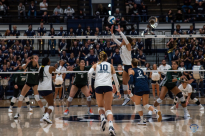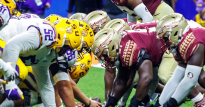March’s Biggest Debate: Strength of Schedule
College basketball, more than any other sport in America and arguably the world, relies on resume building for a chance to win a championship.
Entry into the NCAA Tournament, fondly referred to as “March Madness,” can be just that, madness, for teams whose resumes aren’t as impressive as others.
Often times the game of life is more about who you know rather than what you know, and for teams looking for at-large bids into the NCAA Tournament, it could come down to who did you play rather than how did you play.
Strength of schedule is the key to resume building and examines how tough, moderate or easy a team’s road was during the regular season.
Teams that play in a power conference such as the Big Ten or the Big East have an advantage in resume building simply because they are contractually obligated to play the best teams in the country every single week.
Other teams, such as current AP No. 1 Gonzaga of the West Coast Conference, don’t have the luxury of playing the Indiana’s and Georgetown’s of the world week in and week out and thus have to rely on resume building by scheduling top teams in their non-conference schedule.
The Ratings Percentage Index, used by the NCAA to help select at-large teams and seeding for the NCAA Tournament, has been replicated by ESPN’s resident bracketologist Joe Lunardi to provide college basketball enthusiasts with various data on each and every team.
The piece of data that is of great interest to this story is the non-conference strength of schedule category that examines just that: a respective team’s strength of schedule against non-conference adversaries.
Often times there is a strong correlation to how greatly a team tested itself during non-conference play and where it ultimately ranks in the RPI around the start of the NCAA Tournament.
For example, Duke, currently No. 1 in the RPI, also had the toughest non-conference strength of schedule in country according to the RPI.
With non-conference matchups, and victories, against Minnesota, VCU, Louisville, Ohio State and Temple, among others, it’s easy to see why the Blue Devils had the toughest non-conference road to navigate.
On the flipside, Michigan, eighth in the RPI, and Georgetown, ninth, had the 176th and 193rd “toughest” non-conference schedules, respectively, in the country, but find themselves among the college basketball elite and in serious consideration for a No. 1 overall seed in the tournament.
Each team heavily relied on building its resume through their respective conference schedules as Michigan ranks 44th in conference strength of schedule and Georgetown ranks 25th in the land.
The Wolverines Big Ten rival Michigan State has the distinction of having the toughest conference road to the NCAA Tournament with two matchups apiece against conference foes Indiana, Ohio State, Minnesota, Wisconsin and of course Michigan.
Many people around the country, myself included, will look at Michigan’s non-conference schedule and see three victories against Pitt, Kansas State and then #18 NC State and think the Wolverines’ non-conference schedule ranking is a lot lower than it should be.
Let the debate begin.
Perhaps no other team’s non-conference resume is under a greater microscope then that of current AP No. 1 Gonzaga.
The Zags, sporting a spotless 16-0 conference record, were expected to clean house in the West Coast Conference before the year began so their conference dominance shouldn’t come as a shock.
Part of that expectation is because Gonzaga has proven to be the king of the WCC in recent years, winning 15 WCC regular season titles since 1994 and 11 WCC tournament titles since 1995.
The other half of that expectation is because the WCC is simply not that competitive overall.
Besides Gonzaga, the only other WCC team with a shot at making the NCAA Tournament field, barring an unforeseen victor in the WCC tournament, is Saint Mary’s, who Lunardi currently projects as a 10-seed.
While the first meeting between Gonzaga and Saint Mary’s was a competitive one with the Bulldogs winning 83-78, the second matchup was all Gonzaga in a 77-60 victory.
The Gaels of Saint Mary’s are expected to earn an at-large spot in the NCAA Tournament field despite their 157th ranking in non-conference strength of schedule with only a victory over fellow mid-major Creighton to brag about.
Gonzaga’s non-conference strength of schedule, at 94th “toughest” in the country, was highlighted by victories over Kansas State and Oklahoma State, with each of its two losses coming against non-conference foes Butler and Illinois.
If you look at Gonzaga’s matchups against Oklahoma State, 69-68 victory, and Butler, 64-63 loss, each game very easily could’ve resulted in two wins or two losses for the Bulldogs instead of a split.
Mid-major’s non-conference strength of schedule is much more heavily scrutinized then that of the power conferences.
Few people will complain about Michigan’s apparent lack of non-conference competition if it can post a respectable Big Ten record, which currently sits at 11-5.
Mid-major conferences also don’t have the luxury of a team posting a below .500 record in conference play and still making the NCAA Tournament, such as Illinois who is 8-9 in the Big Ten and currently slated to make the “big dance.”
That is why mid-majors have to rely on non-conference victories against power conference opponents to pad their resumes when tournament time comes around.
Besides, the road to the NCAA Tournament was never supposed to be an easy one.
More often than not, the team that navigates around the most potholes and hazards on the road to the final dance is the one most equipped to win it all
Case in point is last year’s NCAA men’s basketball champion Kentucky who defeated three ranked non-conference opponents on its road to victory.
Where are the Wildcats this year you might ask: currently on the outside looking in, along with their 69th “toughest” non-conference strength of schedule.
Aaron Carr is a junior majoring in journalism. To contact him, email adc5230@psu.edu.








